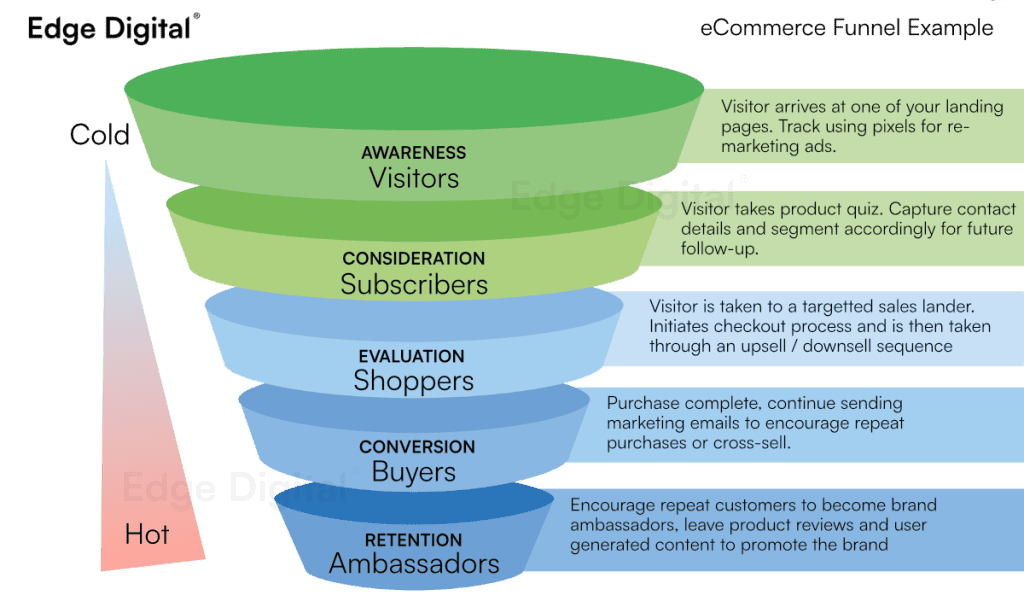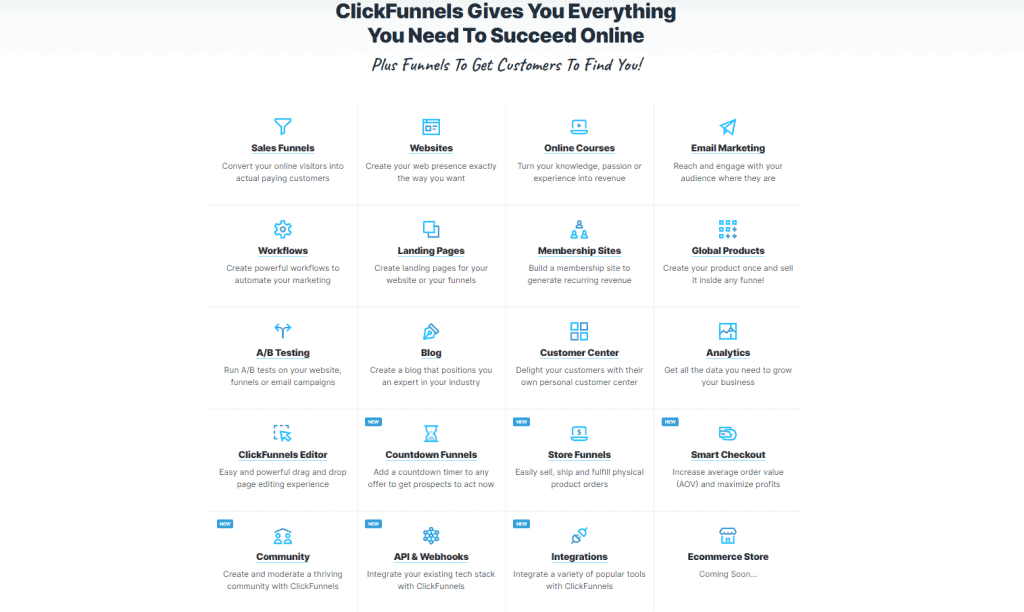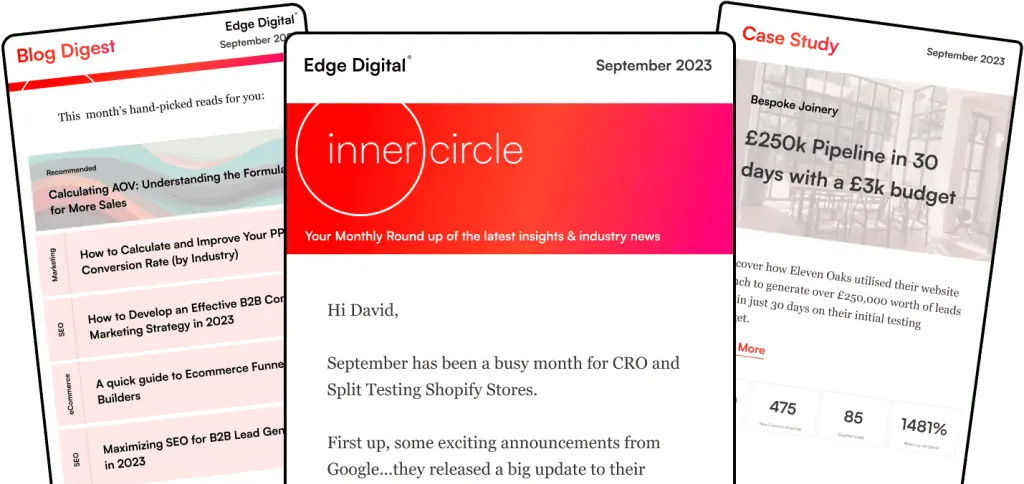A funnel builder is a powerful tool for any ecommerce business. It helps bridge the gap between your website and prospective customers, allowing you to convert leads into sales. Selecting the best sales funnel builder is crucial as it can significantly enhance revenue through customizable sales journeys and analytics. Funnel builders track customer behaviour and provide useful insights that can help you optimize your website for maximum sales conversion. In this guide, we’ll discuss what an ecommerce funnel builder is, how it works, and why you should use one for your business.
Ecommerce funnel optimization is more critical than ever, with the average shopping cart abandonment rate topping 75%. Studies show that optimized funnels can increase conversion rates by up to 400%. Major brands like Nike and Sephora have tapped funnel builders to maximize sales. This comprehensive guide will explore how ecommerce businesses can leverage funnel builders to boost revenue.
Key Features of Funnel Builders
Funnel builder software provides a suite of tools to optimize each customer touchpoint. Key capabilities include:
Landing Page Editor: Build high-converting pages and optimize layouts/copy with A/B/n testing tools. Pre-made templates based on best practices provide a starting point. It’s worth noting if you’re running a Shopify Store, that you may want to use your preferred builder like Page Fly or Gem Pages.
Email/SMS Campaigns: Send automated messages with personalized dynamic content. Leverage workflows to send emails based on customer actions. We tend to recommend Klaviyo if you’re running Shopify. Mailerlite is another good option, but will require more manual setup.
Analytics: Track goal completions, monitor drop-off rates, run funnel visualizations, and more. Heatmaps provide visitor behavioural data.
Integrations: Connect funnel builder to ecommerce platforms, payment systems, help desk, and more. Zapier integration allows connecting 1000+ apps.
CRM: Manage customer profiles and track their journey over time to leverage across touchpoints.
Funnel Templates: Pre-built frameworks for common funnels like sales, webinars, subscriptions, and more.
Upsells & Order Bumps: One of the quickest way to achieve a better Average Order Value (AOV) is to implement One-Click Upsells and Order Bumps pre-checkout.
Affiliate Program: Some funnel builders allow you to run an affiliate program, an incredibly powerful way to find new sales and revenue.
Optimizing the Ecommerce Sales Funnel
The typical ecommerce sales funnel includes five stages:

ecommerce funnel builder example
Awareness Stage
Attract a broad audience by focusing on informational content about product category and buyer needs/pain points as part of a comprehensive marketing strategy.
Goal is to get onto potential customers’ radar early in the research process.
Consideration Stage
Offer comparison pages, content about product selection factors, pros/cons lists to guide potential customers through the sales process. Help shoppers determine best fit.
Retarget visitors with relevant content to keep your brand top of mind.
Evaluation Stage
Share detailed product info, user reviews, demonstration videos, free trials of the product. Highlight how the platform can create sales funnels that cater to specific audience needs, offering flexibility and customizability for tailored campaigns.
Make it easy to compare products using grids, calculators.
Conversion Stage
Ensure mobile optimization for easy checkout. Use trust factors like security badges, guarantees.
Personalize messaging based on customer interests and behaviors.
Offer limited-time promotions or free shipping to incentivize purchase.
Retention Stage
Provide excellent post-purchase support and resources like help guides.
Offer rewards program or exclusive offers to repeat customers.
Example: Sephora executes a highly optimized funnel that converts site visitors into loyal customers. By identifying behaviors, they serve personalized content that matches visitor needs, driving millions in incremental revenue.
Note: This is an example of the eCommerce Funnel. If you’re in a B2B Market like SaaS for example, you may want to reference our guide on B2B Sales Funnel Strategies instead.
top 5 ecommerce funnel builder
Why Choose an “eCommerce Funnel” vs. a Traditional E-Commerce Store?
There are a few key reasons why using a funnel builder can be beneficial compared to only having a traditional ecommerce store for your online business:
Guides and nurtures customers through a journey – A funnel builder allows you to map out an optimized path to guide customers through awareness, consideration, and decision stages. This is more comprehensive than just a store’s product pages and shopping cart flow.
Maximizes opportunities to convert – Each stage of the funnel can be designed to convert visitors, from attracting subscribers with a blog, converting prospects with a webinar, and offering discounts at checkout. More touchpoints mean more chances to drive conversions.
Personalization capabilities – Funnel builders make it easy to create personalized experiences like sending abandoned cart emails or showing different offers based on interests. This level of personalization is harder to achieve with a basic store.
Advanced analytics – Funnel builders provide visual analytics and insights into your conversion process. You can see where dropoff happens and continuously optimize the journey. Limited analytics are available out of the box with most store platforms.
Marketing integrations – Email, social, SMS, and other marketing channels can be integrated into funnel builder workflows. This allows creating holistic customer experiences across channels beyond just the store.
Easier optimization – Funnel builders make A/B testing and iteration easier through landing page editors, versioning, and conversion rate data. Optimizing a basic store requires more technical work.
While a funnel builder requires additional setup, the payoff is higher conversion rates and a more scalable high-performance buying process for customers. It acts as a layer on top of the store to maximize results.
What Is an Ecommerce Funnel Builder?
A sales funnel builder is a software platform designed to help you build online funnels for your business. These funnels are designed to maximize sales conversion rates by targeting leads with relevant offers and content throughout their purchase journey.
The goal of an ecommerce funnel builder is to optimize each step of the customer’s journey so that they are more likely to complete a purchase. This involves creating custom emails, ads, landing pages, and product pages that capture the attention of prospective customers and motivate them to take action. Additionally, most funnel builders include analytics tools that allow you to measure the performance of each element in order to identify areas where improvement may be needed.
Benefits of Using an Ecommerce Funnel Builder with Marketing Automation
Using an ecommerce funnel builder has many benefits for your business. First, it can significantly reduce the amount of time spent on the funnel building process because all of the elements are already built into the platform.
Second, it allows you to quickly test different campaigns in order to see which ones generate the best results and then make adjustments accordingly. Third, it makes it easier for you to create a seamless experience for potential customers by connecting all of your online channels (e-mail marketing campaigns, social media posts, etc.).
Finally, it allows you to track customer behaviour so that you can identify opportunities for improvement or areas where you need more resources or personnel in order to maximize conversions.
Choosing the Right Ecommerce Funnel Builder
With many WordPress funnel builder options, focus on tools that are easy to use, provide excellent support, integrate with your ecommerce platform, and offer advanced analytics. Make sure to evaluate cost, scalability needs, and ease of getting started with pre-made templates.

Some Funnel builders like Click Funnels are “Fully Featured” and can be a viable alternative to the more traditional platforms like Shopify and WooCommerce.
Here is an overview of some of our favourite funnel builders for ecommerce websites:
Klaviyo – email and SMS marketing platform
Pros: Powerful segmentation and behavioral targeting, excellent deliverability, full ecommerce data integration
Cons: Can be complex to set up for non-technical users
Omnisend – omnichannel customer engagement
Pros: User-friendly, unified messaging across channels, product recommendations engine
Cons: Less robust segmentation compared to some tools
Privy – popups, email collection, and SMS
Pros: Intuitive interface, exit-intent and scroll triggered popups, spin-a-wheel gamification
Cons: Light on analytics and segmentation capabilities
Bolt – checkout optimization
Pros: One-click checkout, built-in fraud protection and payments
Cons: Limited integration capabilities beyond checkout
Zipify Pages – landing page builder
Pros: Tight Shopify integration, free basic plan, easy customization
Cons: Templates can be limiting for advanced users
ClickFunnels – sales funnels
Pros: A/B testing, extensive template library, excellent education
Cons: Steep learning curve, significant upsell practices
ActiveCampaign – CRM and email marketing
Pros: Automated customer journeys, free plan available
Cons: Setup and interface not as intuitive as some alternatives
AI-Powered Funnel Builders / Tools:
Here are some of the latest AI-powered and enabled funnel builders and marketing platforms:
Drift – Conversational marketing platform that uses AI bots to qualify leads, book meetings, and nurture customers through personalized engagements.
Instapage – Landing page builder that utilizes AI to provide optimization recommendations for pages to improve conversions.
Unbounce – Similar to Instapage, provides an AI-powered conversion intelligence tool to analyze landing pages and make actionable suggestions.
ActiveCampaign – Offers an AI powered automation tool that can trigger personalized customer journeys based on real-time behavior and intent.
Keap – All-in-one CRM and marketing automation platform that uses AI capabilities for lead scoring and predictive recommendations.
Iterable – Cross-channel marketing automation enabled by proprietary AI that customizes messaging and product recommendations.
Acquire – Uses artificial intelligence to generate and optimize digital ads across platforms like Facebook and Google.
Persado – AI writing platform that generates emotionally intelligent marketing copy and creative optimized for conversion.
Mailchimp – Recently launched an AI assistant for their email and automation products to help optimize campaigns.
Phrasee – AI-powered text generation optimized for brand voice and marketing performance. Integrates with email, web, and ad platforms.
The key benefits these AI capabilities offer include personalization at scale, data-driven recommendations and optimization, time savings through automation, and improved conversion rates. The technology is rapidly evolving to provide smarter and easier-to-use funnel builders.
Top 4 most asked Q&A about Ecommerce funnel builder
Q1: What is an Ecommerce funnel builder, and why is it important?
A1: An e-commerce funnel builder is a tool or platform that helps businesses create and optimize the customer journey from the initial visit to a website through to the final purchase. It’s important because it allows businesses to strategically design each step of the buying process, increasing the chances of converting visitors into paying customers. Funnel builders help in tracking user behavior, optimizing sales pages, and automating follow-ups, which collectively boost sales and revenue.
Q2: How does an Ecommerce funnel builder differ from a regular website builder?
A2: While a regular website builder focuses on creating static web pages, an Ecommerce funnel builder is designed to guide users through a specific journey, optimizing each stage to maximize conversions. Funnel builders often include features like drag-and-drop page design, A/B testing, upsell and cross-sell options, and integration with payment gateways and email marketing tools, all aimed at increasing sales effectiveness.
Q3: Can I integrate my existing Ecommerce platform with a funnel builder?
A3: Yes, most e-commerce funnel builders are designed to integrate seamlessly with popular Ecommerce platforms like Shopify, WooCommerce, and BigCommerce. These integrations allow you to connect your product catalog, track customer behavior, and synchronize sales data between the funnel builder and your existing platform, providing a unified approach to managing your online store and sales funnels.
Q4: What features should I look for in an Ecommerce funnel builder?
A4: When choosing an Ecommerce funnel builder, look for features such as easy-to-use drag-and-drop page editors, customizable templates, A/B testing capabilities, integration with payment gateways, and options for upsells and downsells. Additionally, it’s beneficial to have built-in analytics and reporting tools, as well as seamless integration with your existing Ecommerce platform and marketing tools, to fully optimize and track your sales funnels.



